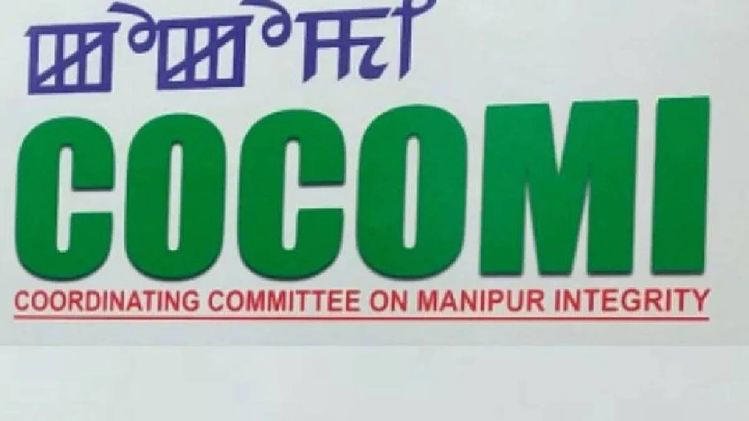COCOMI denounced the Indian government’s portrayal of the Manipur conflict as an ethnic issue. The group alleges that the root causes lie in the state’s covert support of Chin-Kuki militant groups and a deeper geopolitical agenda. COCOMI has demanded the abrogation of the SoO pact and a terror-free environment before any real peace can begin.
BY PC bureau
April 5, 2025
The Coordinating Committee on Manipur Integrity (COCOMI) has strongly criticized the recent meeting orchestrated by the Union Home Ministry between representatives of the Meetei and Chin-Kuki-Mizo-Zomi-Hmar communities in New Delhi, dismissing it as a “stage-managed spectacle” designed to reinforce a misleading narrative about the ongoing violence in Manipur.
COCOMI is a civil society organization based in Manipur, formed by representatives of several Meetei civil society groups
In a press communiqué issued today, COCOMI announced its conscious decision to boycott the talks, which it claims were convened merely to support Union Home Minister Amit Shah’s characterization of the conflict as an “ethnic clash” sparked by a High Court directive on Scheduled Tribe (ST) status for Meeteis.
“This narrative is a gross distortion of facts,” the communiqué stated. “It disregards the deep-rooted and far more dangerous issues at play—namely, the ongoing proxy war allegedly enabled by the Indian government through its continued patronage of Chin-Kuki narco-terrorist groups under the Suspension of Operations (SoO) agreement since 2005.”
Also READ: NHRC Acts on Kohur’s Complaint Against “Targeted” Violence in Manipur
COCOMI alleges that these armed groups—described as mercenaries of foreign origin—have been protected and emboldened by the Centre, and have played a central role in sustaining the violence and destabilizing the region.
The organization said that during previous interactions with central officials, including a meeting in Imphal, they clearly conveyed the people’s view that the Indian government is not a neutral mediator, but an active party to the conflict.
“The so-called ‘peace
COCOMI calls Peace Talks a "Facade" to build on the MHA's false narrative that Manipur issue as ethnic clash due to the ST issue.
While we welcome the peace initiative, one cannot close our eyes to the uncomfortable and embarassing reality that MHA hasn't cracked down on the… pic.twitter.com/izYcCyryOl
— Meitei Heritage Society (@meiteiheritage) April 5, 2025
initiative’ is nothing more than political optics,” the statement added, accusing the Centre of using symbolic gestures and hastily organized meetings to fabricate an illusion of progress. According to COCOMI, these efforts are deliberately timed to give the Union Home Minister favorable talking points in Parliament, while doing little to resolve the actual conflict.
ALSO READ: Tibet “Hell” Under China: Report Details Decade of Excesses
Eight Demands for a Path to Genuine Dialogue
In a pointed critique, COCOMI listed eight key demands that it says are essential prerequisites for any meaningful resolution:
- Statewide Rule of Law: Immediate enforcement of law and order across Manipur.
- Neutralization of Hostile Forces: Dismantling and disarming of SoO-affiliated militant groups operating with impunity in the hill districts.
- Accountability: Legal action against groups unlawfully occupying territory and blockading highways.
- End of SoO Agreement: Immediate cancellation of the SoO pact and removal of foreign-origin militants.
- Uninterrupted Transportation Access: Assurance of safe and unimpeded travel across vital highways, which was notably absent during the March 8 disruption.
- Legal Prosecution: Targeting individuals and groups resisting peace efforts, including those undermining the Governor and Home Minister’s interventions.
- Acknowledgment of Core Issues: Addressing illegal immigration, narco-terrorism, and secessionist ambitions like Zalengam and Kukiland.
- Direct Engagement with Armed Groups: Since civilian representatives have been bypassed by SoO leadership, the Centre must speak directly with the militant command structures.
COCOMI also reiterated that civil society organizations lack the authority or capacity to disarm militant factions or enforce peace. “It is solely the Government of India’s responsibility to create a terror-free environment necessary for civilian-level dialogue,” it emphasized.
Government Accused of Strategic Manipulation
The organization went further to accuse the Government of India of weaponizing ethnic identities to implement a covert “divide and rule” strategy, exploiting the Manipur conflict for larger geopolitical objectives, including counter-insurgency operations and maneuvering in the Indo-Myanmar frontier.
According to COCOMI, these tactics are part of a larger agenda that involves crafting an international narrative to obscure state complicity while furthering strategic goals.
A Call for Global Awareness
COCOMI concluded by calling on the people of Manipur, Indian citizens, and the global community to see through what it terms a “deceptive game” being played by the Centre.
“We remain open to all sincere efforts toward peace and coexistence among the diverse communities of Manipur,” the statement said. “But we stand firm in our pursuit of justice, lasting peace, and the protection of Manipur’s territorial integrity and indigenous identity.”














